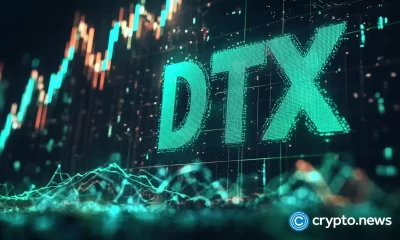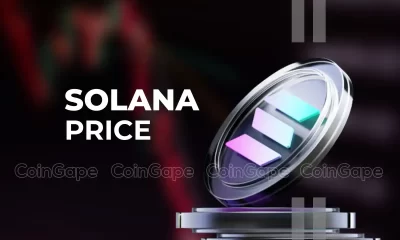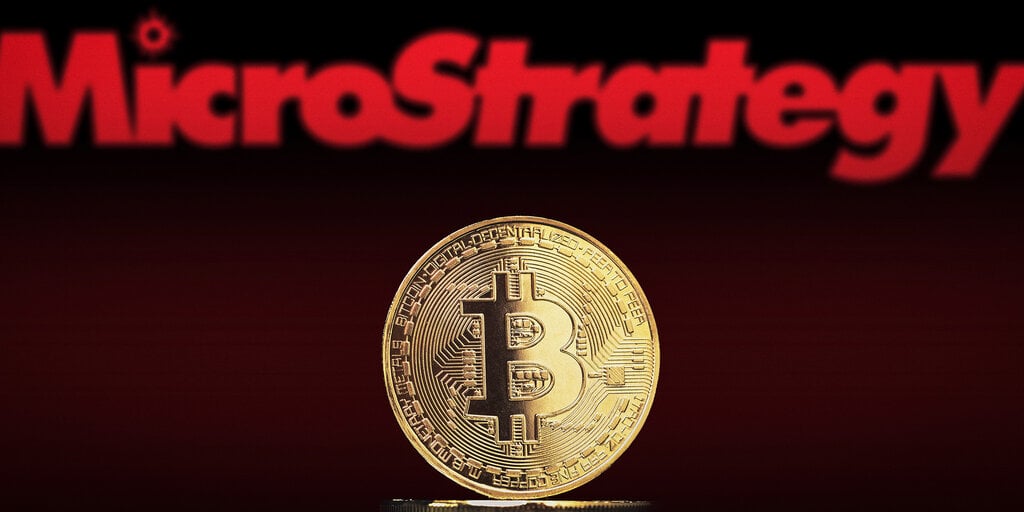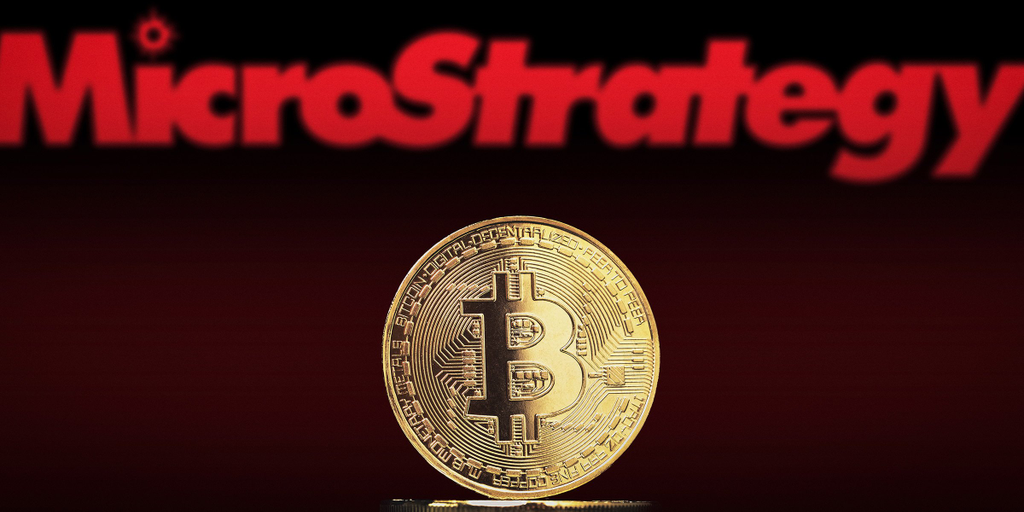business
Marathon Digital Issues $850M Convertible Note Sale to Repurchase Debt, Acquire Bitcoin
Published
4 hours agoon
By
admin

Bitcoin mining company Marathon Digital Holdings (MARA) is issuing $850 million in convertible notes, with the option to expand to $1 billion, as part of plans to repurchase existing debt, acquire Bitcoin, and fund corporate initiatives amid a recovering crypto market.
The Fort Lauderdale, Florida-based firm said Monday it plans to use $199 million of the expected $833 million in net proceeds from the sale to repurchase $212 million of its existing 2026 convertible notes, according to a statement.
The remainder will be allocated to acquiring additional Bitcoin and for general corporate purposes, including working capital, strategic acquisitions, expansion of assets, and repayment of other debt, the company said.
Convertible notes are a type of debt-based financial instrument that a company sells to raise capital. The notes are typically converted into equity shares at a later date, enabling investors to hold partial ownership of the company.
Marathon’s latest offering comes as several firms globally begin acquiring and holding Bitcoin on their balance sheet following a market rally that has catapulted the price of the world’s oldest crypto to more than $94,000.
The most prominent include MicroStrategy, holding up to $30 billion in Bitcoin, and Japan’s Metaplanet, which has scooped up more than 1,000 BTC this year, worth roughly $93 million to date.
Meanwhile, Semler Scientific (SMLR) acquired nearly $18 million in bitcoin earlier this month, the company said in a statement.
Starting December 1, 2027, holders of Marathon’s convertible notes can ask the company to repurchase them for cash, though terms may change if major events like mergers, acquisitions, or delisting occur.
The notes, which mature on March 1, 2030, can also be converted into cash, MARA stock, or a mix of both, the company said.
The Bitcoin miner’s stock traded at $19.86 on Tuesday, up 9% on the day, while its after-hours price remains little changed, Google Finance data shows.
Edited by Sebastian Sinclair
Daily Debrief Newsletter
Start every day with the top news stories right now, plus original features, a podcast, videos and more.
Source link
You may like


Analyst Says Dogecoin Has Way More Room To Grow, Sees Potential Rally to New All-Time High for DOGE


Stablecoins Are Not Your Friends


This new exchange is poised overtake Solana’s price of $240


How Much Could Solana Price Rise This Week?


US Strategic Bitcoin Reserve FOMO Is Being Horribly Oversold


Reddit’s r/cryptocurrency unveils .MOON domain to 8.8m users
business
Bitcoin Multisig Company Casa Makes Self-Sovereignty Easy
Published
14 hours agoon
November 19, 2024By
admin

Company Name: Casa
Founders: Nick Neuman, Jameson Lopp and others
Date Founded: Late 2017
Location of Headquarters: Remote
Website: https://casa.io/
Public or Private? Private
Being self-sovereign isn’t easy — especially if you aren’t technically-minded.
The team at Casa gets this and this is why, for over six years, the company has been helping customers secure their bitcoin in multisig wallets (also referred to as multi-key vaults).
The company was the first to offer an easy-to-use version of such a product that also came with customer support. It was Casa’s plan from the onset to be there for their customers, as this type of support was lacking in the broader crypto industry.
“The service element was what was missing from a lot of solutions out there,” Casa co-founder and CEO Nick Neuman told Bitcoin Magazine.
“People need help doing this stuff, especially for large amounts of money. It was always the plan to support customers, because it was impossible to get support from exchanges or hardware wallets,” he added.
“So, we just took a very support-heavy and user experience focused approach to everything.”
Casa’s approach has paid off, as the company has become a household name in the Bitcoin and crypto space, and has come a long way since Neuman first had the idea for a company like Casa seven years ago.
How Casa Started
It was toward the latter part of the 2017 bitcoin bull run when Neuman had grown tired of his previous work in finance and tech, and found himself down the proverbial Bitcoin (and crypto) rabbit hole. By February 2018, he had an idea for a company and entered himself into a hackathon to attempt to bring the idea to life.
“I participated in the first ETHDenver hackathon,” said Neuman.
“I went in with an idea that I called key split, which was basically taking a private key using Shamir secret sharing and creating a social recovery mechanism,” he added.
“I recruited a couple of people at the hackathon to build it with me, and we ended up winning.”
Neuman quit his job and set out to start a company around this technology he and his team had created. But word had gotten out about his victory at ETHDenver, and the previous CEO of Casa, who was the head of the company before it pivoted to offering multisig wallets, reached out to Neuman, asking him to come on board.
It was after learning that Casa had just recruited Jameson Lopp, self-described “professional cypherpunk” and now Chief Security Officer at Casa, that Neuman decided to join the team.
“I was like, ‘Well, Jameson’s going to be an unfair advantage,’” recalled Neuman with a chuckle. “Instead of starting my own company, I’m going to join.”
Soon after Neuman came on board, Casa retired its then flagship product, the Casa Node, and the company shifted its focus to user-friendly multi-key vaults, a much needed product at the time. Before Casa, multisig software was so complicated that even Neuman himself struggled to use it.
“There was the Armory multisig wallet and the Glacier protocol,” recounted Neuman.
“Glacier wasn’t even software. It was like a giant GitHub repo that you had to follow in order to set up your cold storage. Armory was super janky, too. I remember trying to use it once, and I couldn’t figure it out,” he added.
“We were the first to create multisig that was usable.”
How Casa Works
Casa offers users two main set ups. The first is a five-key vault, which includes three keys on three different hardware wallets, one on the user’s phone (which is backed up securely in the cloud) and one that Casa holds.
This was Casa’s first multisig product, which it rolled out while the company primarily focused on serving customers with a high net worth in bitcoin. Casa learned an important lesson while serving these clients, which was that even if developers create easy-to-use software, people still want an expert there supporting them as they use it — especially if they’re securing a lot of value.
“When you’re dealing with millions of dollars worth of Bitcoin, you really want to have an expert there who helps make sure that you don’t make a mistake,” said Neuman.
Casa’s other main product is for those who might not be sitting on bitcoin whale-type wealth, but who still hold enough bitcoin where a less-than-ideal security setup has the potential to keep them awake at night.
This product is Casa’s three-key vault, which the company brought to market in early 2019. It includes a key on a hardware wallet, a key on the user’s phone (which can be swapped out for another key on a second hardware wallet if the user prefers) and a key that Casa holds.
Casa began offering this setup because it “always wanted to be able to offer great security and usability to as many people as possible,” according to Neuman.
New Casa Services And Features
In the past year, Casa has further broadened the services it offers.
Two weeks ago, it announced its Enterprise Plan, which enables companies to more easily secure their bitcoin treasuries.
“We’ve had businesses using Casa for self-custody for years, but they were always using our retail plans and just making it work,” explained Neuman.
“We changed that, though, because I think corporate treasuries holding bitcoin has been popularized by MicroStrategy. We actually see that as a growing trend that’s worth taking advantage of, and we’re hearing from more Bitcoin companies that are storing bitcoin on their balance sheet that they need help with security,” he added.
This summer, Casa also began enabling users to replace hardware wallets used in their vaults with YubiKeys.
“We see people struggle with hardware wallets all the time, and so we were thought ‘How can we make this simpler?’” said Neuman. “We pieced together a couple of new pieces of technology that have passkey and and YubiKey key capabilities and were able to build something that hadn’t been done before.”
And in March, Casa launched Casa Inheritance, a service that makes it easier for the loved ones of Casa users to access the bitcoin secured in the vaults in the event of a user’s death.
“With Inheritance, we heard from our customers all the time ‘Okay, I feel good about my Casa setup, but I’m worried about what happens if I die,’” explained Neuman. “So, we built that feature to make it super easy for their family to recover the bitcoin in case the main account holder dies.”
Normalizing Multisig
Despite all of the work Casa has done in the last six years, some still have an emotional block when it comes to switching to a multisig setup. Whether it’s because this type of wallet format was more difficult to enable years ago or because it’s understandably anxiety-provoking to make changes to one’s bitcoin security, people seem to drag their feet when it comes to using a multisig setup — even if they really want to — according to Neuman.
“They hear the word ‘multisig’ and they’re like, ‘That’s too hard,’” explained Neuman. “What they don’t realize is that to get started with multisig with Casa, you can use your same hardware wallet, and it is literally the same amount of effort as using a hardware wallet, but you significantly improve your security by doing it.”
Neuman thinks that more people will come around and that multisig will become more widely adopted, especially during a bull market.
“It takes the price of bitcoin going up where people suddenly have more value to secure,” said Neuman. “And it takes people hearing from their friends ‘Yeah, I’m doing multisig and it’s not as hard as it sounds.”
For those that do get the urge to try Casa, the company is allowing people to try the service at no charge for a month.
Neuman feels that as more users come on board, it will not only benefit them, but potentially the industry at large as well.
“If we can make it out of this bull market without another massive blow up like FTX because we’ve helped more people self-custody in a way that they feel good about, that feels like a real win to me.”
Source link
business
MicroStrategy Just Bought Another $4.6 Billion Worth of Bitcoin
Published
2 days agoon
November 18, 2024By
admin

MicroStrategy, a software firm founded by Michael Saylor, disclosed Monday morning that it has bought another 51,780 Bitcoin at an average price of $88,627, totaling $4.6 billion, according to an SEC filing.
As he always does, the company’s Executive Chairman, Saylor, boasted about the purchase on Twitter by noting that the company’s holdings now total 331,200 Bitcoin. The software company’s Bitcoin stash was acquired for $16.5 billion in total, but thanks to the recent price rally, it’s now worth almost double that at $29.65 billion.
MicroStrategy has acquired 51,780 BTC for ~$4.6 billion at ~$88,627 per #bitcoin and has achieved BTC Yield of 20.4% QTD and 41.8% YTD. As of 11/17/2024, we hodl 331,200 $BTC acquired for ~$16.5 billion at ~$49,874 per bitcoin. $MSTR https://t.co/SRRtRrB2jO
— Michael Saylor⚡️ (@saylor) November 18, 2024
The latest move comes after the firm purchased $2 billion Bitcoin just last week, at an average price of $74,463. Combined, that means MicroStrategy has bought 51,780 Bitcoin over the past seven days.
For perspective: This figure is twice the global Bitcoin exchange-traded product (ETP) inflow over the past week, according to Vetle Lunde, Head of Research at K33Research.
MicroStrategy added 51,780 BTC last week!!!
That’s just crazy. It’s a figure twice the global BTC ETP inflow over the past week of 25,993 BTC. pic.twitter.com/IHjJ0ub1si
— Vetle Lunde (@VetleLunde) November 18, 2024
Bitcoin’s price has been surging since Donald Trump secured a second term as President of the United States. The pro-crypto candidate has made a range of promises to the industry, from creating a strategic Bitcoin reserve to firing SEC Chair Gary Gensler.
The orange coin has broken its all-time high price mark multiple times over the past two weeks, with its latest peak being $93,477, according to CoinGecko. With this, MicroStrategy’s stock price also hit an all-time high, surpassing a market capitalization of $69 billion last week, thanks to the firm stockpiling Bitcoin.
Last week, according to Google Finance, MSTR traded at a peak of $383 and has since fallen to a current price of about $350. Meanwhile, Bitcoin has risen by nearly 11% over the past 7 days to a current price of $90,765.
Founded in 1989, MicroStrategy was originally a data intelligence software company. However, in 2020, the firm bought $250 million worth of Bitcoin as Saylor looked to spice up the company’s books during the pandemic.
Since then, the firm’s destiny has been closely tied with Bitcoin, with MicroStrategy even rebranding itself as a Bitcoin development company. In October, MicroStrategy outlined a plan to purchase $42 billion worth of Bitcoin over the next three years.
Saylor has set jaw-droppingly bullish targets for Bitcoin. In September, the firm’s founder predicted that Bitcoin would rise to a price of $13 million per coin over the next 21 years. From today’s price, that would represent a 14,222% increase.
These targets help explain why MicroStrategy has continued to acquire Bitcoin amid its recent pump, despite the firm already being the public company with the largest Bitcoin holding with more than 1% of the total supply.
Edited by Stacy Elliott and Andrew Hayward
Daily Debrief Newsletter
Start every day with the top news stories right now, plus original features, a podcast, videos and more.
Source link
business
Solana’s Tensor Teases Social Trading App to Rival Pump.fun
Published
6 days agoon
November 13, 2024By
admin

Tensor, the Solana-based NFT marketplace, teased more details about its latest venture: Vector.fun, a new platform that will blend social engagement with token trading in a mobile-first app across multiple blockchain networks.
The company’s founders shared details about the trading platform on social media on Tuesday, emphasizing that its development spun out of NFT fatigue and the market’s attention becoming “tokenized memetic.”
“We saw an explosive new market emerge out of nowhere and we realized it was going to be the horse of this cycle. We knew we had to go in and win,” said Tensor co-founder Ilja Moisejevs on Twitter (aka X). “Just like early NFTs—there was no shortage of trading products… and just like early NFTs—they all sucked. We thought we could do better. So we imagined a 10x experience,” he posted.
The platform, which has been in private beta for the last few months, aims to redefine trading by combining it with social interaction in a SocialFi experience. In other words, Tensor aims to put the meme coin banter, flexing, and community-building all in one spot.
“Trading crypto with your internet friends and bonding over the latest meme is SocialFi. Building a great social trading experience is SocialFi. Vector is SocialFi,” said co-founder Richard Wu.
A waitlist for early access was open for a brief period early this week, but intense demand forced the team to discontinue signups. Waitlisted parties are expected to get a chance to use Vector.fun in the next few weeks as the team gradually rolls out access. Holders of the company’s NFT collection, Tensorians, can skip the waitlist by confirming ownership via Discord.
Tensor rose to prominence in the late stages of 2023, stealing Solana NFT trading volume from Magic Eden while achieving a market share as high as 85.2% in January 2024, according to data from Andrew Hong’s Solana NFT marketplace Dune dashboard.
Upon launch, Tensor’s Vector.fun will enter a highly competitive space and compete directly with notable meme coin trading terminals like Photon, BullX, and Jupiter’s ApePro, which have gained notoriety for their trading speed and meme coin discoverability.
Meme coin trading, particularly on Solana, has been on fire this year. That’s been led in large part by the Solana meme coin factory Pump.fun, which made it cheap and easy for just about anyone to launch a new token.
Since the start of the year, users on Pump.fun have created more than 3 million new meme coins, according to data on Dune. A few of those tokens—such as Peanut the Squirrel (PNUT) and Goatseus Maximum (GOAT)—have grown to sizable market caps and earned early entrants considerable gains.
Trading meme coins, though, comes with hefty risks, as most new tokens die quick deaths. The biggest winners of the meme coin craze are arguably the trading platforms that host them. Pump.fun, for instance, has so far earned more than $180 million in revenue from degens creating and flipping tokens.
Will Tensor be able to take on the incumbent and get a slice of that pie? It’s done it before.
Edited by Guillermo Jimenez and Andrew Hayward
Daily Debrief Newsletter
Start every day with the top news stories right now, plus original features, a podcast, videos and more.
Source link

Analyst Says Dogecoin Has Way More Room To Grow, Sees Potential Rally to New All-Time High for DOGE

Stablecoins Are Not Your Friends

This new exchange is poised overtake Solana’s price of $240

How Much Could Solana Price Rise This Week?

Marathon Digital Issues $850M Convertible Note Sale to Repurchase Debt, Acquire Bitcoin

US Strategic Bitcoin Reserve FOMO Is Being Horribly Oversold

Reddit’s r/cryptocurrency unveils .MOON domain to 8.8m users

Coinbase To Delist wBTC Trading Amid Justin Sun Increasing Influence

Ethena Sees $1B Inflows as Crypto Rally Brings Back Double-Digit Yields

Good Riddance, Martin Gruenberg

Phantom acquires Blowfish to boost wallet security

Which Crypto Coin Is Winning the Market Right Now?

SUI Price Stability At $3.5 Signals Room For More Growth, $4 Mark Imminent?

Bitcoin Multisig Company Casa Makes Self-Sovereignty Easy

Shiba Inu price prepares a big move as burn rate surges 940%
182267361726451435

Top Crypto News Headlines of The Week

Why Did Trump Change His Mind on Bitcoin?

New U.S. president must bring clarity to crypto regulation, analyst says

Ethereum, Solana touch key levels as Bitcoin spikes

Bitcoin Open-Source Development Takes The Stage In Nashville

Will XRP Price Defend $0.5 Support If SEC Decides to Appeal?

Bitcoin 20% Surge In 3 Weeks Teases Record-Breaking Potential

Ethereum Crash A Buying Opportunity? This Whale Thinks So

Shiba Inu Price Slips 4% as 3500% Burn Rate Surge Fails to Halt Correction

‘Hamster Kombat’ Airdrop Delayed as Pre-Market Trading for Telegram Game Expands

Washington financial watchdog warns of scam involving fake crypto ‘professors’

Citigroup Executive Steps Down To Explore Crypto
Mostbet Güvenilir Mi – Casino Bonus 2024

Bitcoin flashes indicator that often precedes higher prices: CryptoQuant
Trending

 2 months ago
2 months ago182267361726451435

 24/7 Cryptocurrency News3 months ago
24/7 Cryptocurrency News3 months agoTop Crypto News Headlines of The Week

 Donald Trump4 months ago
Donald Trump4 months agoWhy Did Trump Change His Mind on Bitcoin?

 News3 months ago
News3 months agoNew U.S. president must bring clarity to crypto regulation, analyst says

 Bitcoin4 months ago
Bitcoin4 months agoEthereum, Solana touch key levels as Bitcoin spikes

 Opinion4 months ago
Opinion4 months agoBitcoin Open-Source Development Takes The Stage In Nashville

 Price analysis3 months ago
Price analysis3 months agoWill XRP Price Defend $0.5 Support If SEC Decides to Appeal?

 Bitcoin4 months ago
Bitcoin4 months agoBitcoin 20% Surge In 3 Weeks Teases Record-Breaking Potential


